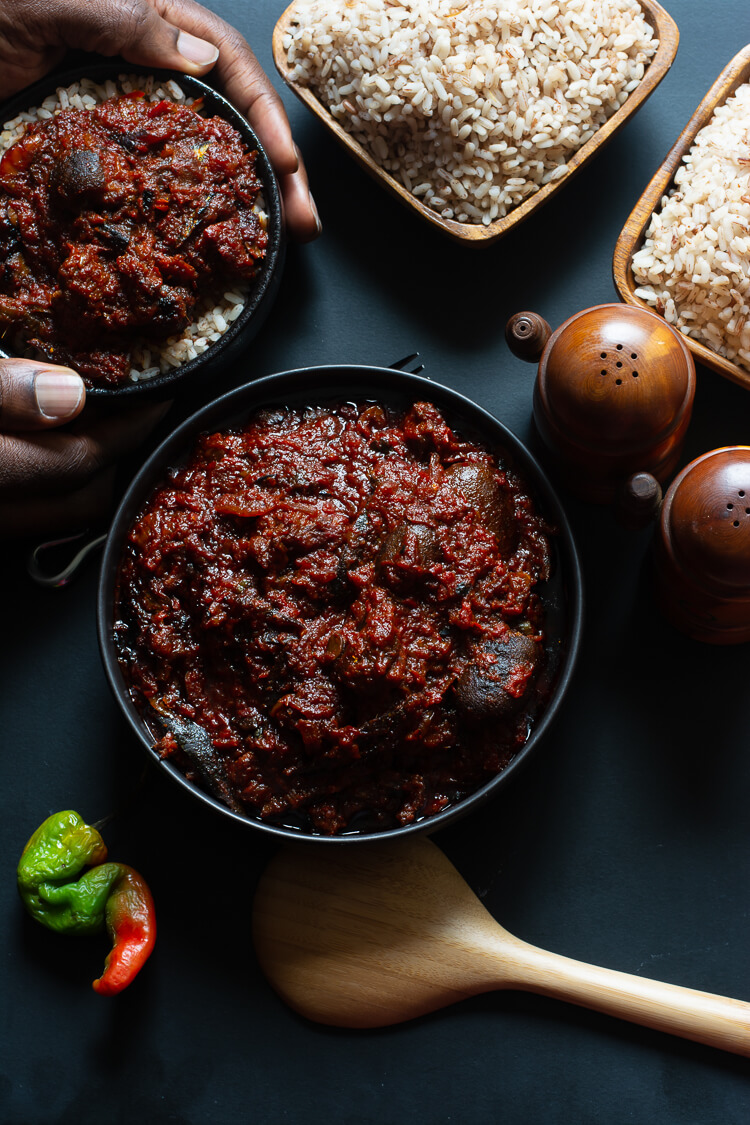This ofada stew/ofada sauce recipe features a stew that originates from the Western part of Nigeria and is commonly eaten with a locally grown rice called ofada rice. The story of Ofada rice and stew is one that somewhat inspires me. It is actually a culinary example of a grass to grace/ cinderella story; one that is similar to the story of many local and indigenous Nigerian foods, traditions and even languages. I love how ofada stew has since evolved to becoming a cherished dish in Nigeria, so before I talk about how to make ofada stew, I’d love to share how this native delicacy evolved from being the overlooked native food to being the choice of even the most elite Nigerian celebrations.
Once upon a time Ofada rice and stew was not a posh dish. It was somewhat looked down upon, and those who enjoyed it may have been looked at as unexposed, and unrefined. The more common stew was made with refined vegetable oils and tomatoes (delicious for what it is), and has a milder flavor than ofada stew. Ofada stew is one of those dishes that packs a major punch as it is flavored with smoked died shrimp, and fermented locust beans, locally called iru. To the “snobby” nose, the smell of Iru and smoked dried shrimp cooking in a stew may have been somewhat off putting, as such it was not appealing to many. When people had the option to display your sophisticated pallet, they often chose westernized dishes that lacked the pungency and grit of local Nigerian flavors, and unfortunately, Ofada rice and stew was one of those looked down on.
Fast forward a couple of years, the movement to embrace made in Nigeria products and culture began to blossom and the appreciation and love for our local delicacies was revived. Ofada stew the once “ugly” sister to the common tomato stew, started to make appearances at parties and weddings. Ofada became the topic of everyone’s food gist, and it continued to grow in popularity till it made its way to the menu of fancy restaurants. Nowadays, you can even find Ofada listed in many little children’s essay assignments as their favorite food. That is the mini story of Ofada stew, (well, according to my recollection).
Ofada stew has a twin sister dish in another local stew natively called ‘ayamase’ (alternatively nicknamed ‘designer stew’ in Nigeria). In fact, both stews are sometimes used interchangeably, however there is a slight technical difference between them: ofada stew is made with red peppers while ayamase is made with the green variety. Ofada stew got its name originally from ofada rice, the local starch with which it is most closely paired. Ofada rice is a blend of rice unique to West Africa, which due to its unpolished nature, retains a lot of the rice bran on the grains (because of its difficulty to mill, earning the nomenclature of partly milled rice). This makes ofada rice tougher to cook but far more nutritious, because the presence of the nutrient bearing hull retains a lot of the naturally occurring fiber, manganese, magnesium and selenium that is removed from the more processed white rice.
Please refer to my braising technique, for the correct way to braise the goat meat used in this recipe. While ofada sauce/stew is usually eaten with ofada rice, it also goes great with white rice, brown rice and yam.
Now that you’re here why not take a quick second and click the links to FOLLOW ME ON PINTEREST or INSTAGRAM? You can catch some behind the scenes stuff on my Instagram, pin this ofada rice and stew/ofada sauce recipe for later or explore some of my favorite recipes on Pinterest and if you love it as much as I know you will, SHARE with some friends!
How to Make Ofada Stew (Nigerian Ofada Sauce recipe)
Ingredients
- 7 large bell peppers
- 3 scotch bonnet peppers
- 4 large red onions
- 2 lbs braised goat meat (braised with 1 red onion, 1 scotch bonnet pepper, 1 tsp salt and 1 tsp bouillon)
- 80 grams cleaned smoked dried fish (about 0.17lbs)
- 20 grams smoked dried shrimp about (0.04 lbs)
- ½ cup palm oil
- 2 tsps bouillon
- salt to taste
- 1 tbsp Iru (fermented locust beans) (optional)
Instructions
- Cut the peppers, and 2 red onion into small chunks, and blend roughly

- Boil the blended peppers on medium high heat till it reduces to a paste

- While the peppers are reducing, slice 2 red onions and set aside
- In separate pot, saute the sliced red onions in palm oil on medium heat til the onions turn slightly brown.

- Add in the cleaned smoked dried fish, the shrimp and continue to cook for another 10 minutes.
- Add in the reduced pepper paste, turn the heat down to low-medium, and continue cooking for 10 minutes. Add in the braised goat meat and the braising liquid and continue cooking for 15 minutes.

- After 15 minutes of cooking, add in the iru and bouillon, stir, and continue cooking until the stew separates from the oil (this could take about 10 minutes).

- Serve with boiled ofada rice or white rice

Notes
Now that you know how to make ofada stew properly, I hope you enjoy the spicy yet amazing flavors this delicacy assaults your taste buds with! You can also officially claim bragging rights and Nigerian street cred for being able to reproduce what has become one of our most delicious indigenous dishes! Let me know what you think of this ofada stew recipe in the comments below and don’t forget to rate!












65 Comments
Omotayo
November 22, 2018 at 4:45 amPls what is bouillon in Yoruba thnks
Lois
January 8, 2019 at 9:11 amHello Omotayo! Bouillon is simply seasoning cubes or powder like maggi or knorr, which ever brand is your favorite.
Mj
August 20, 2020 at 4:36 amOmi eran bibo
Becline
December 21, 2020 at 10:39 pmBouillon are seasoning eg Maggi, knorr, royco, tasty cubes etc
Broth is omi eran bibo
joy
December 4, 2018 at 7:56 amhum mm still looking at the picture over and over again this is my hubby favorite meal good work dear
Lois
January 8, 2019 at 9:17 amThank you so much Joy!!!
Sa'adiyya Ameen
August 21, 2020 at 2:13 pmCan i use powdered fermented locust bean instead of the one you used?
Fatima
December 13, 2018 at 9:22 amHi Lois,
I love the story behind Ofada Rice and stew. I live in Northern Nigeria, and just recently tried the Ofada Rice at a wedding party!…Its soooooo delicious and full of healthy nutrients! Thanks for the Recipe. Will sure try it at home
Lois
January 8, 2019 at 9:59 amI am happy to hear that Fatima! I hope you enjoy it!
Tracy
May 8, 2019 at 2:11 pmI’m so happy learning the recipe to this great dish..can’t wait to cook it for my darling ..cux he’s been on my neck about how badly he wants to try it out❤️❤️❤️thank you
Rik
June 15, 2019 at 8:48 pmI was eating Ofada at 1:00am when I found this post. Lol
Lois
June 24, 2019 at 10:07 amLol! Lucky you!
Mirabel Samuel
August 5, 2019 at 12:17 amHello Ma, awesome job you are doing..
But I wanted to find out. You didn’t bleach your oil
Lois
August 5, 2019 at 7:06 amHi Mirabel! Thanks for your compliment. You are right, I did not bleach my palm oil. I do not believe it is healthy to bleach palm oil because of the fumes released from when the oil is bleached.
Arnold Onyemah
March 17, 2020 at 3:09 pmI love this recipe but what type of palm oil or what is done to the palm oil before use because its my first time making it and I’m not sure the outcome
ifeoma
April 20, 2020 at 8:48 amThanks for the recipe. Sure it’s a sought after at parties. I’m familiar with green coloured ofada stew. Yours is red, what’s the difference and how do you get that colour without compromising the taste. Thanks dear
Precious
May 10, 2020 at 8:47 amImma try this out real soon😂❤️
Please I would need your help concerning pastry🙏❤️
Jane
June 30, 2020 at 7:16 amNice recipe. Am confused about the ‘iru’ though, is it the same as the one used for making cocoyam soup?!
Ellah Anyim
July 21, 2020 at 2:43 pmThank you, Lois. I have had a craving for Ofada stew for a while now, but I did not want to bleach my palm oil as I don’t have a lot of it in store, I live in a shared accommodation, and I just don’t think it’s too healthy. But with this recipe, I’m literally about to go get me some bell peppers to make this and enjoy with some brown rice. Hopefully, it comes out great!
P.S. I will be following you on Pinterest!
Kind regards.
Adebayo pamilerin
September 14, 2020 at 12:52 pmNice one but what is the different btw Bell pepper and bonnet pepper pls
Cyril Udofa
March 5, 2021 at 12:13 amBell pepper is Tatashi while scotch bonnet is the regular fresh pepper
Funke Ayoola
October 4, 2020 at 11:30 amI made mine but I added tomatoes bcoz hubby dosen’t like too much pepper it came out beautifully well thank you for the recipe.
KB
November 15, 2020 at 8:02 pmThis was a joy to cook. I used some habenaros instead of bonnets. My dish has a nice smoky flavor and a nice spice. I enjoy how the goat blends it flavor with the dried fish and shrimp. I used some basmati rice mixed with pink rice and some freekeh.
Nifemi Makanjuola
March 26, 2021 at 11:16 amI just cooked this for my parents and they loved it!
Iyeh
May 10, 2021 at 1:00 pmI just tried it, and it came out beautiful, all thanks to you, I followed the recipe from start to finish
Dayo
October 29, 2021 at 12:24 pmLois
I’ve always been an ofada fan. I carried 5kg of ofada to UK last year to ensure the kids retain the taste of Naija. For the first time I’ve tried your recipe using diced beef in the absence of goat meat and ponmo! This will go with brown rice. Thanks for making Naija food global.
sofia
May 24, 2022 at 3:04 pmthank you ,i love the meal and i wanted to make it.
Chioma
June 18, 2022 at 12:04 amThanks it was great
Vera
September 29, 2022 at 12:59 pmThis has been helpful, thank you so much 🥰